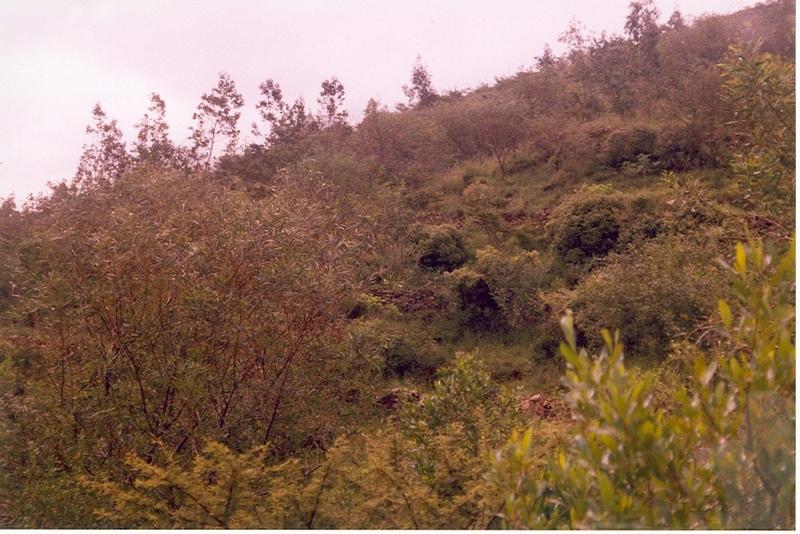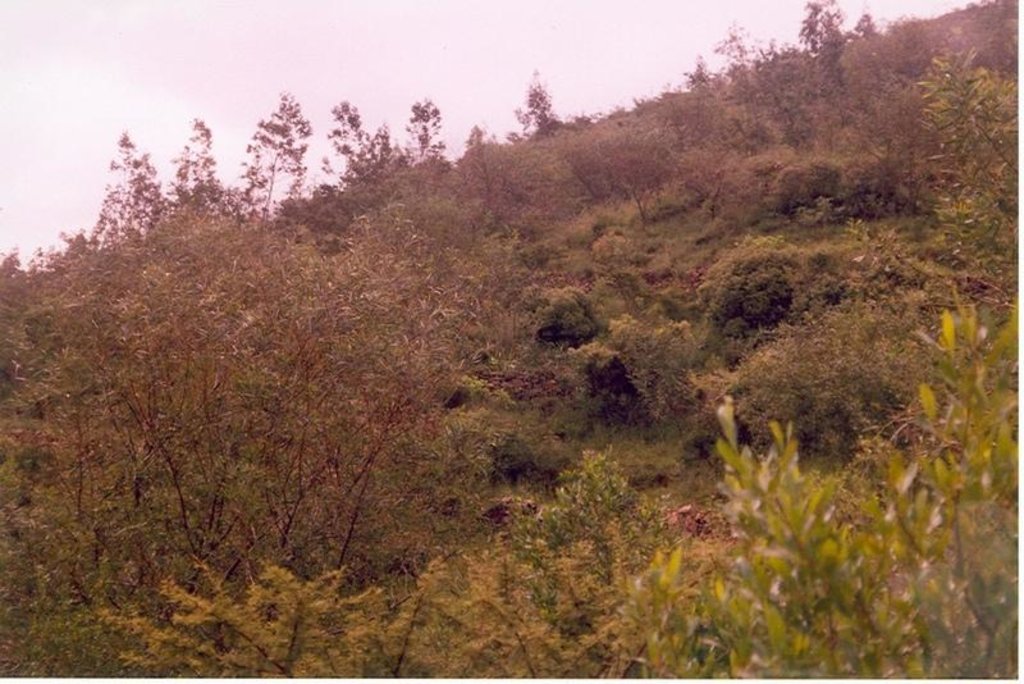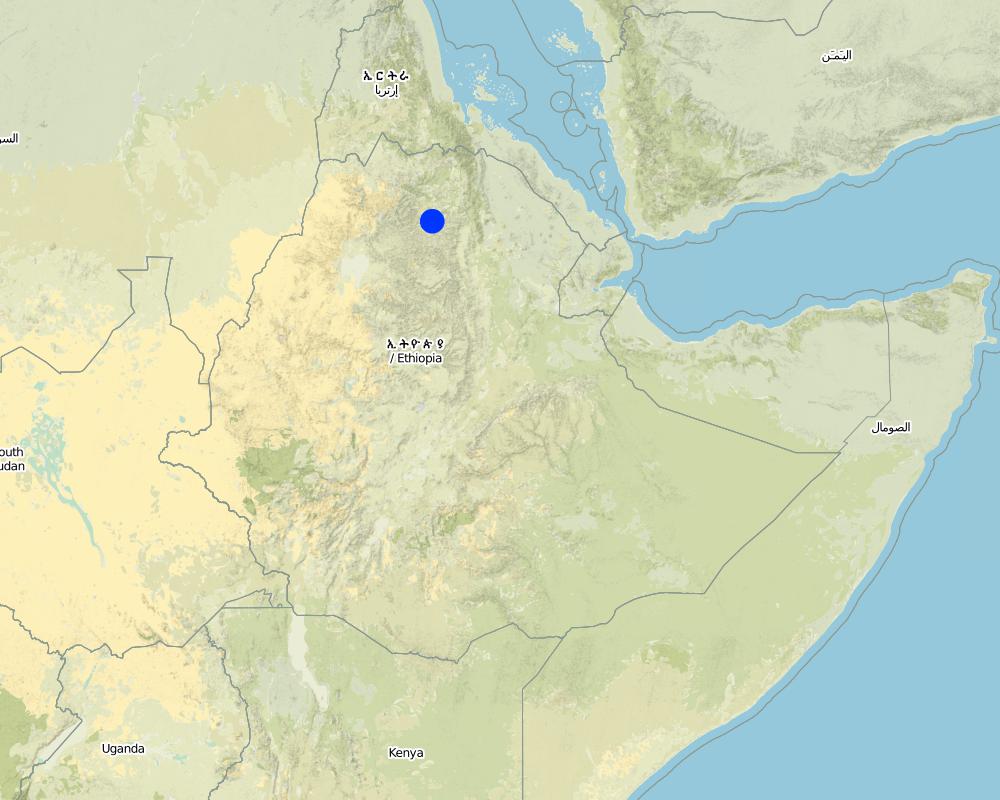Stone faced trench [埃塞俄比亚]
- 创建:
- 更新:
- 编制者: Unknown User
- 编辑者: –
- 审查者: Fabian Ottiger, Alexandra Gavilano
Emnigetsu metrebawi zala
technologies_1396 - 埃塞俄比亚
查看章节
全部展开 全部收起1. 一般信息
1.2 参与该技术评估和文件编制的资源人员和机构的联系方式
关键资源人
SLM专业人员:
Giday Hlefom
Ministry of Agriculture and Natural Resources
埃塞俄比亚
有助于对技术进行记录/评估的机构名称(如相关)
Ministry of Agriculture and Natural Resources of Ethiopia (MoA) - 埃塞俄比亚1.3 关于使用通过WOCAT记录的数据的条件
编制者和关键资源人员接受有关使用通过WOCAT记录数据的条件。:
是
2. SLM技术的说明
2.1 技术简介
技术定义:
Construction of stones walls along the contour with trenches on the upper side of the structure while the upper part of the structure filled with soil and compacted.
2.2 技术的详细说明
说明:
allignment of the soil along the contour, diiging of foundation, trench construction, spacing tie ridge, tree planting,
Purpose of the Technology: reduce erosion, increase soil moisture, recharge ground water, decrease ground water
Establishment / maintenance activities and inputs: stone wall construction, trench digging, tree and forage planting, area closure
Natural / human environment: enhance vegetation growth, decrease desertification, increase biodiversity
2.3 技术照片
2.5 已应用该技术的、本评估所涵盖的国家/地区/地点
国家:
埃塞俄比亚
区域/州/省:
Tigray
有关地点的进一步说明:
Atsbi Womberta
注释:
Total area covered by the SLM Technology is 20.3 km2.
in some places some of the structures spacing closer than the design requirement
Map
×2.6 实施日期
如果不知道确切的年份,请说明大概的日期:
- 50多年前(传统)
2.7 技术介绍
详细说明该技术是如何引入的:
- 通过项目/外部干预
注释(项目类型等):
From outside the country
3. SLM技术的分类
3.1 该技术的主要目的
- 减少、预防、恢复土地退化
- 保持/提高生物多样性
3.2 应用该技术的当前土地利用类型
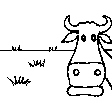
牧场
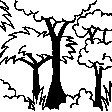
森林/林地
- (半天然)天然森林/林地
- 植树造林
(半天然)天然森林/林地:具体说明管理类型:
- 皆伐
产品和服务:
- 薪材
- 其它森林产品
- 自然保持/保护
- Cut and carry
注释:
Major land use problems (compiler’s opinion): deforestation, soil erosion and overgrazing
Major land use problems (land users’ perception): shortage of fuel wood, shortage of food, shortage of drinking water, soil erosion
Clear felling of (semi-)natural forests: illegal cutting of trees
Plantation forestry: Yes
3.4 供水
注释:
Number of growing seasons per year:
1
Specify:
Longest growing period in days: 180 Longest growing period from month to month: Jun - Oct
3.5 该技术所属的SLM组
- 横坡措施
3.6 包含该技术的可持续土地管理措施
3.7 该技术强调的主要土地退化类型

土壤水蚀
- Wt:表土流失/地表侵蚀
- Wg:冲沟侵蚀/沟蚀
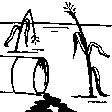
化学性土壤退化
- Cn:肥力下降和有机质含量下降(非侵蚀所致)
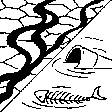
水质恶化
- Ha:干旱化
注释:
Main type of degradation addressed: Wt: loss of topsoil / surface erosion
Secondary types of degradation addressed: Wg: gully erosion / gullying, Cn: fertility decline and reduced organic matter content, Ha: aridification
3.8 防止、减少或恢复土地退化
具体数量名该技术与土地退化有关的目标:
- 减少土地退化
注释:
Secondary goals: prevention of land degradation, rehabilitation / reclamation of denuded land
4. 技术规范、实施活动、投入和成本
4.1 该技术的技术图纸
技术规范(与技术图纸相关):
Technical knowledge required for field staff / advisors: moderate
Technical knowledge required for land users: moderate
Main technical functions: control of dispersed runoff: retain / trap, control of concentrated runoff: retain / trap, reduction of slope angle, reduction of slope length
Secondary technical functions: improvement of ground cover, increase of infiltration, water harvesting / increase water supply
Aligned: -contour
Vegetative material: T : trees / shrubs, G : grass
Number of plants per (ha): 2500
Vertical interval between rows / strips / blocks (m): 1
Spacing between rows / strips / blocks (m): 10
Vertical interval within rows / strips / blocks (m): 0.5
Width within rows / strips / blocks (m): 1
Slope (which determines the spacing indicated above): 25.00%
If the original slope has changed as a result of the Technology, the slope today is (see figure below): 15.00%
Gradient along the rows / strips: 0.00%
Bund/ bank: level
Vertical interval between structures (m): 1
Spacing between structures (m): 10
Depth of ditches/pits/dams (m): 0.5
Width of ditches/pits/dams (m): 0.85
Length of ditches/pits/dams (m): 5
Height of bunds/banks/others (m): 0.9
Width of bunds/banks/others (m): 1
Length of bunds/banks/others (m): 250
Slope (which determines the spacing indicated above): 25%
If the original slope has changed as a result of the Technology, the slope today is: 15%
Lateral gradient along the structure: 0%
Vegetation is used for stabilisation of structures.
Change of land use practices / intensity level: area closure
4.2 有关投入和成本计算的一般信息
其它/国家货币(具体说明):
birr
如相关,注明美元与当地货币的汇率(例如1美元=79.9巴西雷亚尔):1美元=:
8.0
注明雇用劳工的每日平均工资成本:
0.88
4.3 技术建立活动
| 活动 | 时间(季度) | |
|---|---|---|
| 1. | seedling production | July-June |
| 2. | pitting | April-May |
| 3. | planting | July |
| 4. | over sawing of grasses | July |
| 5. | survey & layout | Dec.-April |
| 6. | collection of stones | Dec.-April |
| 7. | digging foundation & trench | Dec.-April |
| 8. | construction | Jan.-April |
| 9. | site guard | the whole year |
| 10. | enrichment plantation and replanting | onset of rainy season |
4.4 技术建立所需要的费用和投入
| 对投入进行具体说明 | 单位 | 数量 | 单位成本 | 每项投入的总成本 | 土地使用者承担的成本% | |
|---|---|---|---|---|---|---|
| 劳动力 | Labour | ha | 1.0 | 234.0 | 234.0 | 10.0 |
| 劳动力 | Harvesting | ha | 1.0 | 45.0 | 45.0 | |
| 设备 | Tools | ha | 1.0 | 14.0 | 14.0 | 5.0 |
| 植物材料 | Seedlings | ha | 1.0 | 86.0 | 86.0 | |
| 技术建立所需总成本 | 379.0 | |||||
| 技术建立总成本,美元 | 47.38 | |||||
注释:
Duration of establishment phase: 84 month(s)
4.5 维护/经常性活动
| 活动 | 时间/频率 | |
|---|---|---|
| 1. | replanting | July /once |
| 2. | stone collection | January/once |
4.6 维护/经常性活动所需要的费用和投入(每年)
| 对投入进行具体说明 | 单位 | 数量 | 单位成本 | 每项投入的总成本 | 土地使用者承担的成本% | |
|---|---|---|---|---|---|---|
| 劳动力 | Labour | ha | 1.0 | 4.0 | 4.0 | 100.0 |
| 技术维护所需总成本 | 4.0 | |||||
| 技术维护总成本,美元 | 0.5 | |||||
注释:
Machinery/ tools: hand tools
length of structure
4.7 影响成本的最重要因素
描述影响成本的最决定性因素:
labour, slope, low survival rate of seedlings
5. 自然和人文环境
5.1 气候
年降雨量
- < 250毫米
- 251-500毫米
- 501-750毫米
- 751-1,000毫米
- 1,001-1,500毫米
- 1,501-2,000毫米
- 2,001-3,000毫米
- 3,001-4,000毫米
- > 4,000毫米
指定年平均降雨量(若已知),单位为mm:
300.00
农业气候带
- 半湿润
- 半干旱
5.2 地形
平均坡度:
- 水平(0-2%)
- 缓降(3-5%)
- 平缓(6-10%)
- 滚坡(11-15%)
- 崎岖(16-30%)
- 陡峭(31-60%)
- 非常陡峭(>60%)
地形:
- 高原/平原
- 山脊
- 山坡
- 山地斜坡
- 麓坡
- 谷底
垂直分布带:
- 0-100 m a.s.l.
- 101-500 m a.s.l.
- 501-1,000 m a.s.l.
- 1,001-1,500 m a.s.l.
- 1,501-2,000 m a.s.l.
- 2,001-2,500 m a.s.l.
- 2,501-3,000 m a.s.l.
- 3,001-4,000 m a.s.l.
- > 4,000 m a.s.l.
关于地形的注释和进一步规范:
Altitudinal zone: 1500-3000 m a.s.l.
Landforma: Also hillslopes and footslopes
Slopes on average: Also moderate and rolling
5.3 土壤
平均土层深度:
- 非常浅(0-20厘米)
- 浅(21-50厘米)
- 中等深度(51-80厘米)
- 深(81-120厘米)
- 非常深(> 120厘米)
土壤质地(表土):
- 中粒(壤土、粉土)
表土有机质:
- 中(1-3%)
- 低(<1%)
如有可能,附上完整的土壤描述或具体说明可用的信息,例如土壤类型、土壤酸碱度、阳离子交换能力、氮、盐度等。:
Soil texture: Medium (also fine/heavy and coarse/light)
Soil fertility is low-medium
Soil drainage/infiltration is medium
Soil water storage capacity is medium-low
5.6 应用该技术的土地使用者的特征
生产系统的市场定位:
- 生计(自给)
非农收入:
- 低于全部收入的10%
相对财富水平:
- 非常贫瘠
- 贫瘠
机械化水平:
- 手工作业
- 畜力牵引
说明土地使用者的其他有关特征:
Annual population growth: 3% - 4%
40% of the land users are poor and own 40% of the land.
60% of the land users are poor and own 60% of the land.
Off-farm income specification: there is no difference
5.7 应用该技术的土地使用者使用的平均土地面积
- < 0.5 公顷
- 0.5-1 公顷
- 1-2 公顷
- 2-5公顷
- 5-15公顷
- 15-50公顷
- 50-100公顷
- 100-500公顷
- 500-1,000公顷
- 1,000-10,000公顷
- > 10,000公顷
5.8 土地所有权、土地使用权和水使用权
土地所有权:
- 州
6. 影响和结论性说明
6.1 该技术的现场影响
社会经济效应
生产
作物生产
饲料生产
饲料质量
木材生产
生产区域
收入和成本
农业收入
其它社会经济效应
Honey production
社会文化影响
社区机构
SLM/土地退化知识
生态影响
水循环/径流
多余水的排放
土壤
土壤水分
土壤覆盖层
土壤流失
其它生态影响
Biodiversity
Soil fertility
6.2 该技术的场外影响已经显现
旱季稳定可靠的水流
下游洪水
下游淤积
地下水/河流污染
6.4 成本效益分析
技术收益与技术建立成本相比如何(从土地使用者的角度看)?
短期回报:
积极
长期回报:
非常积极
技术收益与技术维护成本/经常性成本相比如何(从土地使用者的角度看)?
短期回报:
稍微积极
长期回报:
积极
6.5 技术采用
在所有采用这项技术的人当中,有多少人是自发的,即未获得任何物质奖励/付款?:
- 0-10%
注释:
100% of land user families have adopted the Technology with external material support
35000 land user families have adopted the Technology with external material support
Comments on acceptance with external material support: estimates
There is no trend towards spontaneous adoption of the Technology
Comments on adoption trend: it is constructed on the hillside and it is labourous
6.7 该技术的优点/长处/机会
| 土地使用者眼中的长处/优势/机会 |
|---|
| highly appreciate the construction of the trench because it enhance soil miosture and improve productivity of land and cropproduction. |
| 编制者或其他关键资源人员认为的长处/优势/机会 |
|---|
| it has a great contribution for the sustainability of production |
| increase the flow of streams |
| recharge and increase water table |
6.8 技术的弱点/缺点/风险及其克服方法
| 土地使用者认为的弱点/缺点/风险 | 如何克服它们? |
|---|---|
| restricts free grazing | allow cut and carry from the area closure |
| 编制者或其他关键资源人员认为的弱点/缺点/风险 | 如何克服它们? |
|---|---|
| it needs much labour during construction | mobilize the community |
| it takes land out of production | integrate the technology with other vegetative measures in order to increase the productivity of land including the areas ocuppied by the structure |
7. 参考和链接
7.1 信息的方法/来源
链接和模块
全部展开 全部收起链接
无链接
模块
无模块


